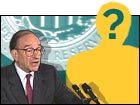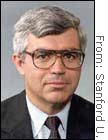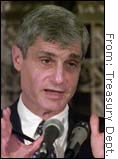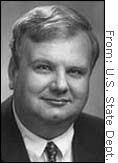
NEW YORK (CNN/Money) -
When Alan Greenspan presides over a meeting of Federal Reserve policy makers Tuesday to discuss short-term interest rates, it will come during what is likely the twilight of Greenspan's illustrious tenure as chairman of the central bank.
Though he's likely to remain as chairman until the end of his term in 2004, it's never too early to play the parlor game of guessing his successor, especially since most analysts think that person is somebody we already know.
So, in the spirit of wild-eyed speculation, here are some of the candidates who could fill Greenspan's shoes:
John Taylor
Ironically, one of the likeliest candidates for the job is also the least well-known. Stanford professor John Taylor, currently the Treasury Under Secretary for International Affairs, is a star in economic circles, but a relative unknown on Wall Street.
Taylor did recently make a splash in the U.S. financial community by shooting down an International Monetary Fund proposal to let nations default on their debt payments, good news for U.S. banks.

His greater contribution, however, is the 1993 Taylor Rule for monetary policy, which has been adopted by central banks around the world. It's a formula for balancing short-term interest rates, gross domestic product, employment and inflation -- sort of a Unification Theory of central banking.
Though Fed policy makers say they use a wide variety of data and anecdotal evidence in setting short-term interest rates, many economists point out that the Greenspan Fed has, whether by accident or design, followed the same course that would have been prescribed by the Taylor rule, which also could explain why inflation has been so weak in recent years.
Perhaps more importantly from President Bush's standpoint, Taylor has strong conservative credentials. He helped Bush and key economic adviser Larry Lindsey craft last year's tax cut plan. He also worked for President Ford, the first President Bush, and Senator Bob Dole, and he is a senior fellow at the Hoover Institution, a conservative think tank.
In fact, Bush asked Taylor to chair the White House Council of Economic Advisers, but he turned the job down, choosing a relatively obscure post in the Treasury Department -- a job held, coincidentally, by previous Fed chairman Paul Volcker.
"I look upon that job as a holding operation," said Andrew Brimmer, a Fed governor from 1966 to 1974 and current president of Brimmer & Co. in Washington, D.C. "I don't think Taylor would be happy to spend four years as the No. 3 person in the Treasury Department."
If Republicans are in control of Congress by 2004, then Taylor's nomination would be relatively smooth. But his relative inexperience in the public eye could cause trouble if the Democrats still control the Senate.
And the Fed chairman must be a consummate politician even after confirmation, as demonstrated by Greenspan, who patiently endured interminable Congressional hearings and stuck scrupulously to his message.
"I'm not sure Taylor has the political savvy for the job," said former Fed economist Wayne Ayers, now chief economist at Fleet Boston Financial. "Greenspan had been in Washington a long time and had a solid reputation. It was no surprise when Volcker was replaced by Greenspan because he was the obvious choice waiting in the wings."
Robert Rubin
In the immediate aftermath of the Sept. 11 terrorist attacks, Congress turned to two men to save the economy, then in danger of sinking into a deep recession: Greenspan and Robert Rubin. Most analysts believe that, if a Democrat were in the White House, Rubin would be a virtual shoo-in to replace Greenspan

But Rubin, now an executive with Citigroup Inc. (C: Research, Estimates), faces high political hurdles with Bush in the White House. Most critically, he was a staunch opponent of Bush's tax cut last year, and it seems unlikely that Bush would risk alienating his conservative base before the 2004 Republican National Convention.
"It's possible Bush would pick a Democrat, but I think it's unlikely," said Allen Meltzer, an economist and Fed historian at the American Enterprise Institute, a conservative think tank in Washington, D.C. "Even supposing there's a Democratic Congress in 2004, then the chances are good that Bush would postpone the appointment to 2005," meaning Greenspan's stay would be extended, since chairmen serve until a successor is named.
And, though he mostly avoided tarnish, Rubin could not escape being splattered a bit when the Enron mess hit the fan. Earlier this year, CNN learned Rubin had called Treasury Under Secretary Peter Fisher to discuss asking debt rating agencies to delay downgrading Enron and that he had earlier been offered a position on Enron's board, an offer he refused.
On the other hand, Enron could very well be a distant memory by 2004. And Bush could decide that a Rubin nomination would send the message that he's serious enough about the economy to risk putting a Democrat in the post.
"There have been times when Democratic presidents picked Republican Fed chairmen and vice versa," said Allen Jacobson, political analyst at Washington Analysis. "I don't think Bush would go necessarily with politics."
Larry Lindsey
Larry Lindsey was a Fed governor from 1991 to 1997 and is, officially, Bush's Assistant for Economic Policy and Director of the National Economic Council at the White House. He was also Bush's chief economic adviser during his presidential campaign and a key aide to Bush's father and President Reagan.

"Glenn Hubbard is chairman of the White House Council of Economic Advisers, but he's not Bush's principal economic advisor. Larry Lindsey is," said former Fed governor Brimmer.
While Bush, known for rewarding loyalty, might be tempted to nominate Lindsey for the Fed job, Lindsey is seen by some as a lightning rod for political controversy, considering his long and vocal association with conservative causes.
His Enron exposure also is considerably deeper than Rubin's -- Lindsey was a paid adviser and a board member -- and he raised hackles earlier this year when he called Enron's collapse a "tribute to American capitalism."
"I believe Bush would not want to run the risk of appointing somebody to the Fed who would be seen as a political handyman," Brimmer said.
William McDonough, Roger Ferguson and other candidates at the Fed
Three of the past five Fed chairmen have come from the New York Fed district, and William McDonough has certainly made a name for himself as president of that jurisdiction since 1993.
"He's instantly recognizable in financial circles and has international stature," former Fed economist Ayers said.
But he's a Democrat, as is Fed Vice Chairman Roger Ferguson.
Ferguson might in a sense seem a logical replacement for Greenspan, but history is also against him -- no vice chairman has ever ascended to the position of chair.
"There have been a few who have lusted after the job, but the vice chairmen are chosen for different purposes," Meltzer said of the American Enterprise Institute. "The Fed is broken down so that the chairman runs policy and handles external relations, while the vice chairman runs the banking and internal part of the organization, and those aren't the skills you look for in a chairman."
Other current Fed presidents mentioned as possible candidates are Bob McTeer of Dallas -- whose Texas connection could help him; Bob Perry of San Francisco, and William Poole of St. Louis.
The next Fed chairman also could come straight from Wall Street, with Goldman Sachs executives Gerald Corrigan -- a former president of the New York Fed -- and Robert Hormats often mentioned.
And Martin Feldstein, president and CEO of the highly regarded National Bureau of Economic Research, which picks the dates of U.S. economic expansions and recessions, also could get the job.
But Feldstein's name is also mud in some conservative circles for his disobeying President Reagan and speaking out against deficit spending when he was chairman of the White House Council of Economic Advisers in the early '80s.

|

